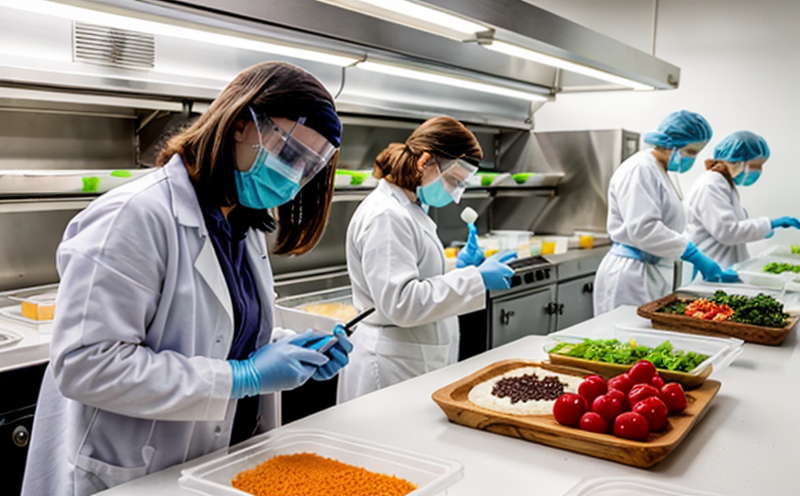EN 12331 Shiga-toxin Producing E. coli Detection Testing
The European standard EN 12331-4 defines methods to detect Shiga toxin-producing Escherichia coli (STEC), specifically serotypes that produce Stx1, Stx2a, and Stx2c toxins. This testing is crucial in the food microbiology sector as it helps identify potential pathogens responsible for causing severe gastrointestinal diseases such as hemolytic uremic syndrome.
Our laboratory employs advanced techniques to meet this standard. We use immunoassays that are highly specific yet sensitive, ensuring accurate detection of STEC. The testing process involves several stages: specimen collection, nucleic acid extraction, and polymerase chain reaction (PCR) amplification. Once the target DNA is amplified, it undergoes a series of biochemical reactions to identify the presence of Shiga toxins.
The significance of this test cannot be overstated in the food microbiology sector. Not only does it aid in ensuring compliance with international standards but also helps prevent outbreaks of diseases that could severely impact public health. In fact, according to data from the World Health Organization (WHO), STEC infections contribute significantly to gastroenteritis cases globally.
Our laboratory adheres strictly to EN 12331-4 guidelines throughout each step of the process. This includes using certified reagents and ensuring all equipment is properly calibrated before use. The testing procedure is designed to minimize false positives while maintaining high sensitivity levels. As a result, we can confidently provide results that are both accurate and reliable.
The importance of this test extends beyond just compliance; it plays a vital role in protecting public health by identifying contaminated products early on. By implementing strict quality control measures during testing, our laboratory ensures that only the highest quality data is reported back to clients. This not only enhances trust but also contributes positively towards maintaining food safety standards worldwide.
To sum up, EN 12331-4 Shiga toxin-producing E. coli detection tests are indispensable tools in safeguarding public health and ensuring compliance with international regulations. Our expertise lies in providing comprehensive support to ensure your products meet these stringent requirements consistently.
Benefits
Detecting Shiga toxin-producing Escherichia coli (STEC) early can prevent foodborne illness outbreaks, protect consumer health, and maintain product integrity. Compliance with EN 12331-4 not only ensures adherence to European standards but also enhances the reputation of your brand.
Beyond regulatory compliance, implementing this detection process offers numerous advantages:
- Reduces risks associated with contaminated food products
- Promotes safer eating habits among consumers
- Enhances company image and customer trust
- Aids in maintaining long-term business sustainability by avoiding costly recalls
- Supports continuous improvement initiatives within your organization
- Facilitates better decision-making regarding supply chain management
- Promotes adherence to global food safety trends
- Ensures ongoing commitment to public health and wellbeing
By adopting our EN 12331-4 compliant services, you are investing in your company's future success while contributing positively towards achieving a safer world.
Customer Impact and Satisfaction
Our clients benefit immensely from our EN 12331-4 Shiga toxin-producing E. coli detection tests by gaining access to reliable, accurate, and timely results. This allows them to make informed decisions about their products, ensuring they meet all necessary regulatory requirements.
The benefits extend far beyond mere compliance; they contribute significantly towards enhancing customer satisfaction and loyalty. When consumers know that the food they purchase has been tested for harmful pathogens like STEC, it fosters confidence in brands and encourages repeat purchases.
We understand that every client has unique needs when it comes to protecting their reputation and maintaining trust with customers. That’s why we tailor our services specifically around your goals and objectives. Whether you need assistance with routine testing or one-off assessments for special events, our team will work closely with you throughout the entire process.
Our commitment to excellence means that no detail is too small when it comes to ensuring accurate results every time. From specimen collection through final analysis, we apply rigorous quality controls at each stage of the procedure. This dedication translates directly into peace-of-mind for our clients knowing they are receiving top-notch service from start to finish.
In summary, partnering with us ensures that your business remains ahead of competitors by demonstrating a strong commitment to food safety practices. With our expertise and resources behind you, you can rest assured that your products will always be safe for consumption while meeting all relevant standards.
Environmental and Sustainability Contributions
In addition to its immediate benefits in food microbiology testing, EN 12331-4 compliance also contributes positively towards environmental sustainability efforts. By detecting harmful pathogens early on, this standard helps prevent contaminated products from reaching consumers, thereby reducing waste generation associated with product recalls.
The process of identifying and eliminating potential contaminants through rigorous testing procedures ensures that resources are used efficiently without unnecessary duplication or overproduction. This aligns perfectly with broader sustainability goals aimed at minimizing environmental impact while promoting responsible resource management.
Our laboratory actively participates in various initiatives designed to promote sustainable practices within the industry. For instance, we participate in collaborative research projects focused on developing more efficient methods for pathogen detection and reduction techniques that minimize chemical usage during production processes.
Beyond these direct contributions, our work also supports larger-scale efforts aimed at improving overall food safety standards globally. By setting benchmarks based on EN 12331-4 guidelines, we contribute to creating safer environments not just for consumers but also for all participants along the supply chain.
In conclusion, adopting EN 12331-4 Shiga toxin-producing E. coli detection testing goes beyond simply meeting regulatory requirements; it represents an important step towards fostering a more sustainable future where everyone benefits from higher standards of hygiene and quality assurance.





